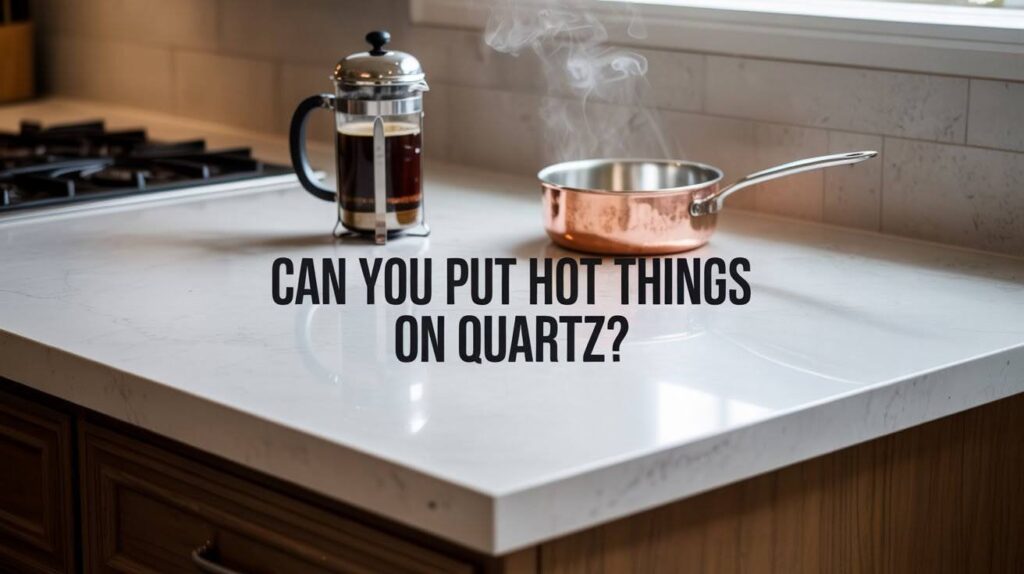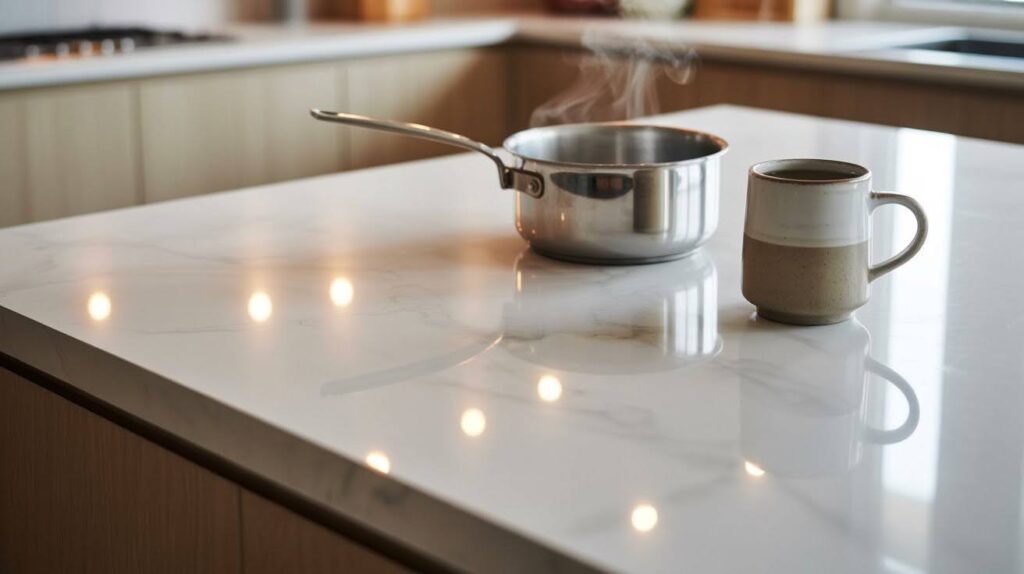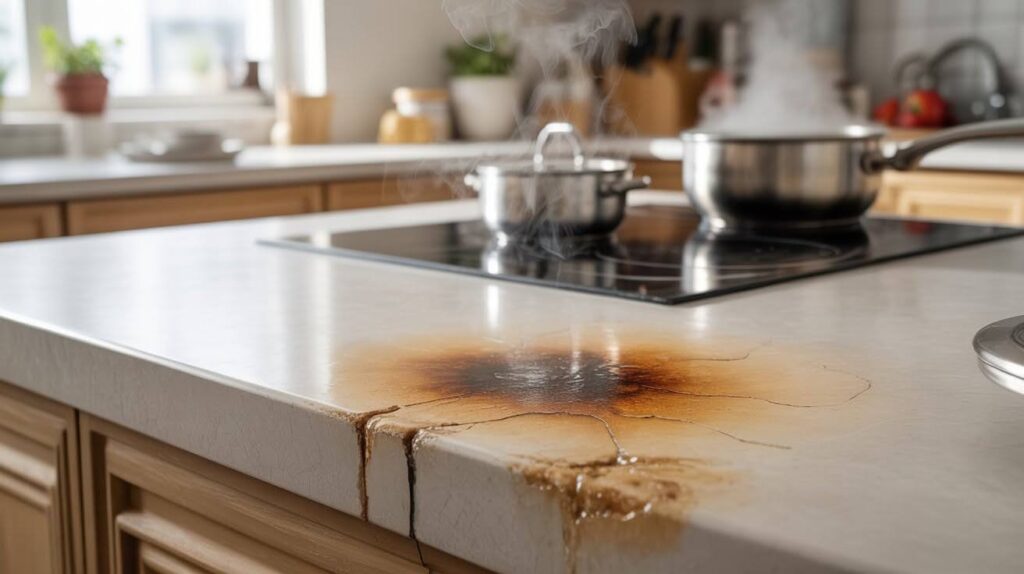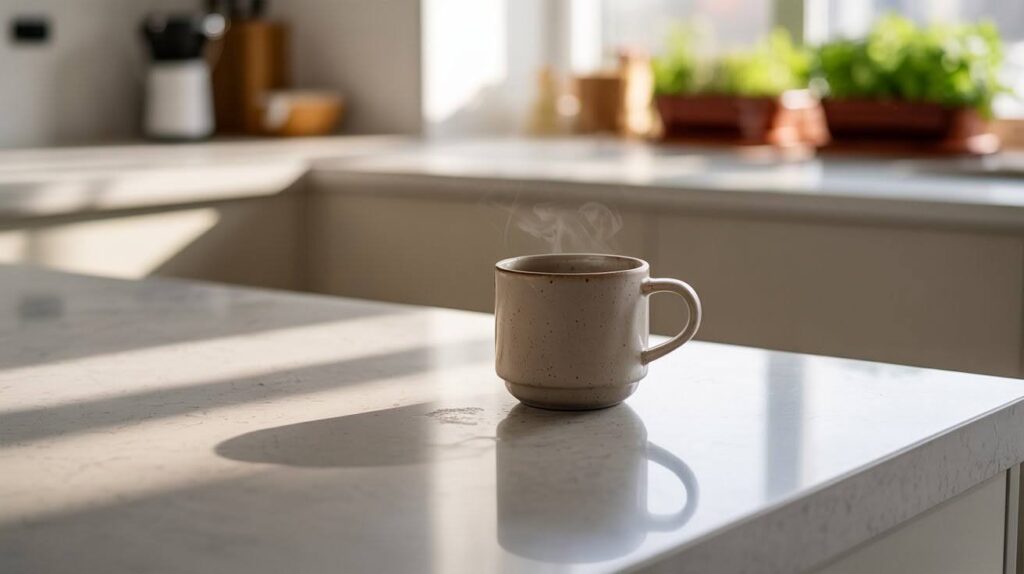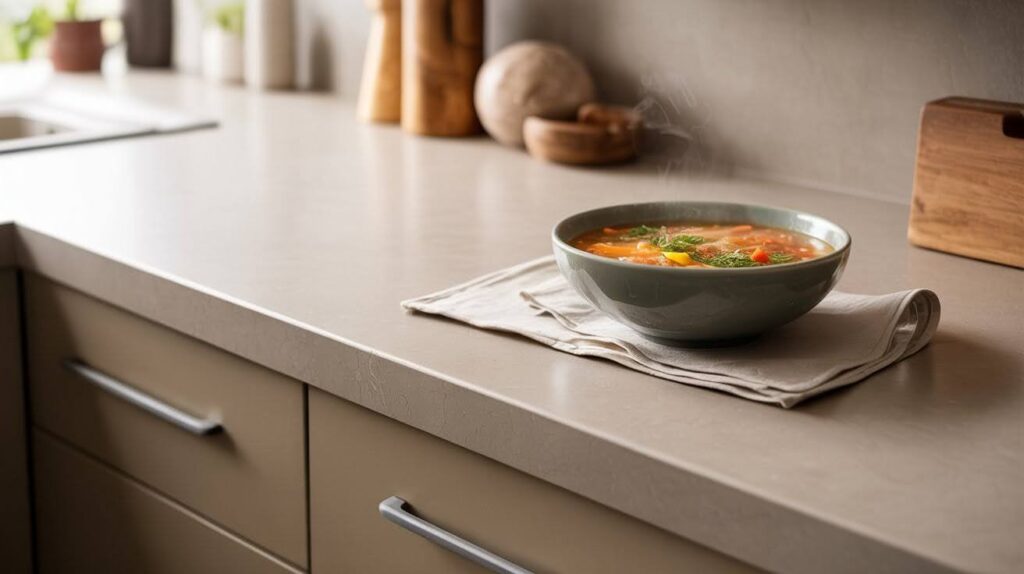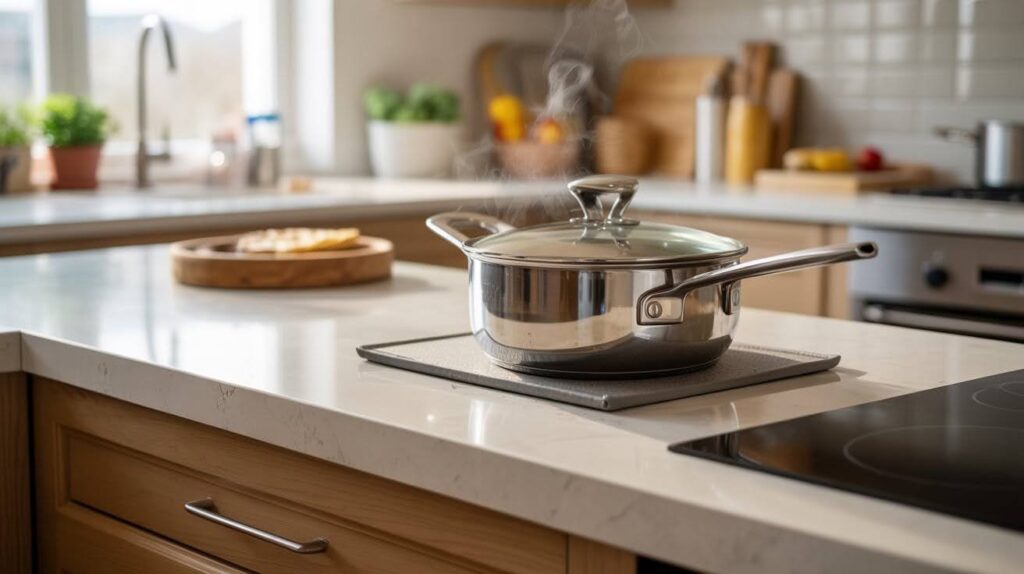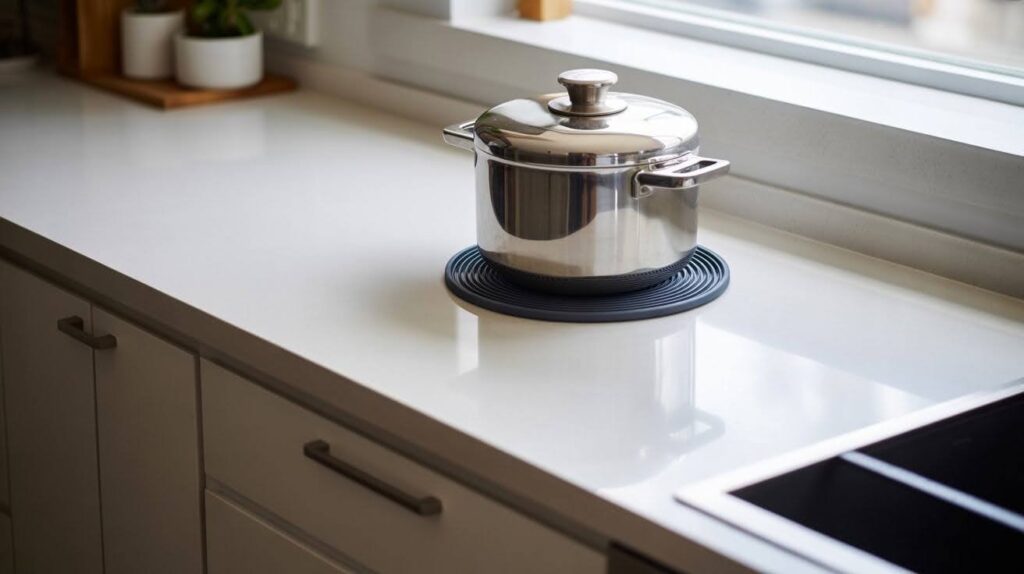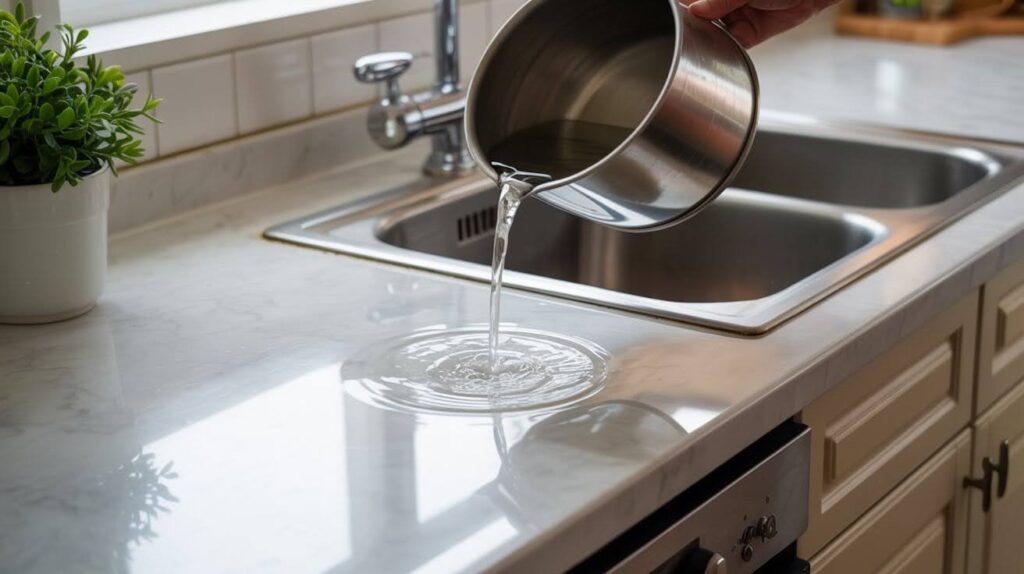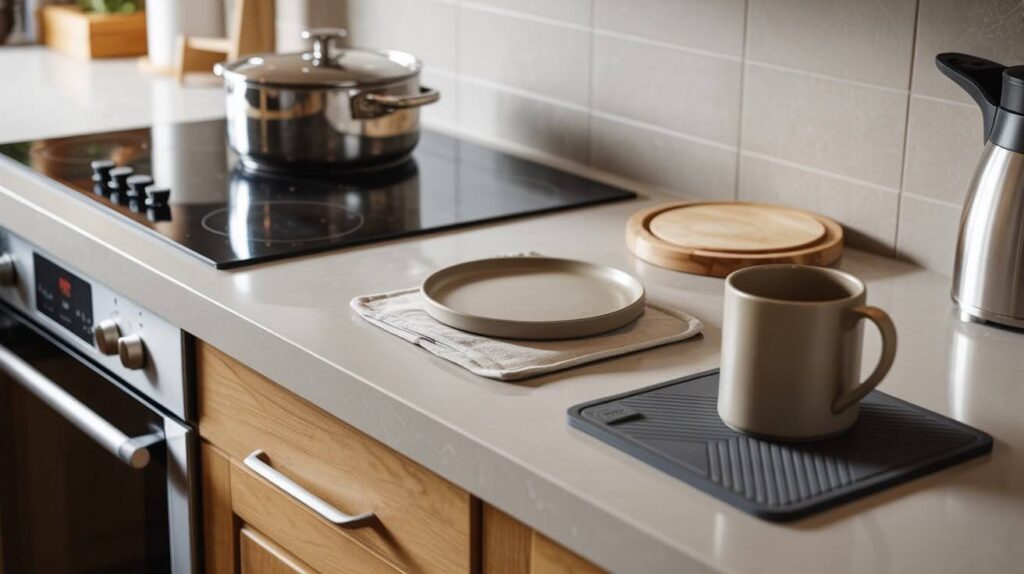Did you take a hot pan from the stove and ask if it can sit on quartz?
Others exist besides yourself. Quartz countertops offer a high-end appearance with durability making those countertops common within contemporary kitchens however some homeowners worry over hot pots and pans.
Can I drink from a steaming coffee mug? Could it leave its spot?
A bowl straight out of a microwave? In this guide here, we will answer all of your questions and show you just how to keep your countertops looking perfect for years now.
How Heat-Resistant Are Quartz Countertops?
Quartz countertops can handle some heat, but they have clear limits. Learn what temperatures are safe and what factors affect their performance.
Composition of Quartz Countertops
Your quartz countertop isn’t made from pure stone. It contains about 90% natural quartz mixed with resins and polymers.
These binding agents hold everything together and give the surface its smooth finish. But here’s the catch. Those same resins don’t handle high heat as well as natural stone does. This is why quartz has limits when it comes to hot items.
Safe Temperature Limits
Quartz countertops can handle temperatures up to about 150°C or 300°F. That might sound like a lot, but it’s not as high as you might think.
Go beyond this limit and you could see problems. The surface might change color. It could warp or even develop cracks. Once this damage happens, it’s often permanent and costly to fix.
Factors Affecting Heat Resistance
Not all quartz countertops react to heat the same way. The quality of your countertop matters a lot. Higher-grade options tend to perform better. Room temperature plays a role too.
If your kitchen is cold, the surface is more likely to crack when exposed to sudden heat. The type of hot item also makes a difference. A scorching pan from the stove poses more risk than a warm coffee cup.
Risks of Placing Hot Items Directly on Quartz
Placing hot items on quartz without protection can cause serious damage that affects both appearance and structure over time.
Scorch Marks and Discoloration
Set a hot pan down on your quartz countertop and you might see marks you can’t remove. The heat can leave brown or yellow stains on the surface.
These scorch marks happen when the resins in the quartz react to high temperatures. Hot dishes, pots, and even spilled liquids can all cause this type of damage. The worst part? These marks often won’t come out no matter how much you scrub.
Cracking from Thermal Shock
Your countertop can crack when temperatures change too quickly. This is called thermal shock. Imagine placing a pot of boiling water on a cool surface.
The sudden temperature difference puts stress on the material. Small cracks can appear almost instantly. These cracks might start small but can grow larger over time. Cold countertops are especially vulnerable to this problem.
Warping
Leave something hot on your quartz for too long and the surface can actually bend or warp. The heat makes the resins soft and unstable.
When this happens, your once-flat countertop develops bumps or uneven spots. This type of damage changes how your counter looks and works. Warped areas can make it hard to place items flat on the surface.
Can You Put Common Hot Items on Quartz?
Not all hot items pose the same risk to your quartz countertops. Here’s what you need to know about everyday kitchen items.
1. Coffee or Tea Cups
Your morning coffee mug is usually safe to place on quartz. These cups don’t get hot enough to cause major damage.
But they can still leave water rings or faint marks over time. Using a coaster is a smart habit. It takes just a second and helps keep your counters looking new.
2. Bowls of Soup or Microwave Plates
Bowls and plates from the microwave are generally okay for quartz. They don’t reach extremely high temperatures. Still, it’s better to be safe than sorry.
Put down a cloth or trivet, especially if your countertop feels cold to the touch. This simple step prevents any potential damage.
3. Hot Pots, Pans, and Baking Trays
Never put these directly on your quartz. Pots and pans from the stove reach temperatures way above what quartz can handle. Baking trays from the oven are just as hot.
Always use a trivet or heat-resistant mat. Keep these items near your stove so they’re ready when you need them.
4. Slow Cookers and Pressure Cookers
These appliances sit in one spot for hours. While they don’t get as hot as stovetops, they produce steady heat for long periods.
That continuous warmth can damage the resin in your quartz. Place a heat protector underneath before you turn them on. This prevents any issues during cooking.
5. Boiling Water Spills
Spilling boiling water directly on quartz is risky. The sudden heat can shock the surface and cause cracks.
This is especially true when your countertop is cold. If you need to drain pasta or pour hot water, do it in the sink. Keep boiling liquids away from your counter surfaces.
How to Protect Quartz from Heat Damage
Keeping your quartz countertops safe from heat is simple with a few practical habits. Always use trivets, hot pads, or mats under hot items.
Keep them near your stove so they’re easy to grab when cooking. Wipe up hot spills immediately and don’t let them sit on the surface.
Use coasters for your cups and mugs to prevent rings and protect against temperature changes. Never place extremely hot appliances or dishes directly on the counter.
Give them a safe spot on a protective pad instead. You can also use insulating cloths or a folded kitchen towel under plates or bowls from microwaves or ovens for extra protection.
Conclusion
So, can you put hot things on quartz? The short answer shows that quartz can handle some heat yet it’s not heatproof.
I’ve seen far too many homeowners learn this the hard way. This results in permanent marks and cracks.
The good news? Trivets, mats, coasters offer countertop protection now. Make of them a part for your cooking.
They should be integral. Most of those habits only take a second to do, but really save you from costly repairs. Your quartz countertops will last for decades if you treat them with proper care. That is simply how very it is.
Frequently Asked Questions
Can I place a hot coffee mug on quartz countertops?
Yes, hot coffee mugs are generally safe for quartz countertops. However, using a coaster is recommended to prevent potential water rings or faint discoloration over time.
What happens if I put a hot pan directly on quartz?
Placing a hot pan directly on quartz can cause scorch marks, discoloration, or even cracks. Always use a trivet or heat-resistant mat to protect your countertop from damage.
At what temperature does quartz countertop get damaged?
Quartz countertops can typically handle temperatures up to 150°C or 300°F. Exceeding this limit can lead to discoloration, warping, or cracking of the surface.
How do I protect my quartz countertop from heat damage?
Use trivets, hot pads, or heat-resistant mats under all hot items. Keep coasters for drinks handy and wipe up hot spills immediately to maintain your countertop’s condition.
Can quartz countertops crack from heat?
Yes, quartz can crack from thermal shock when exposed to sudden temperature changes. This often happens when placing extremely hot items on a cold countertop surface.

